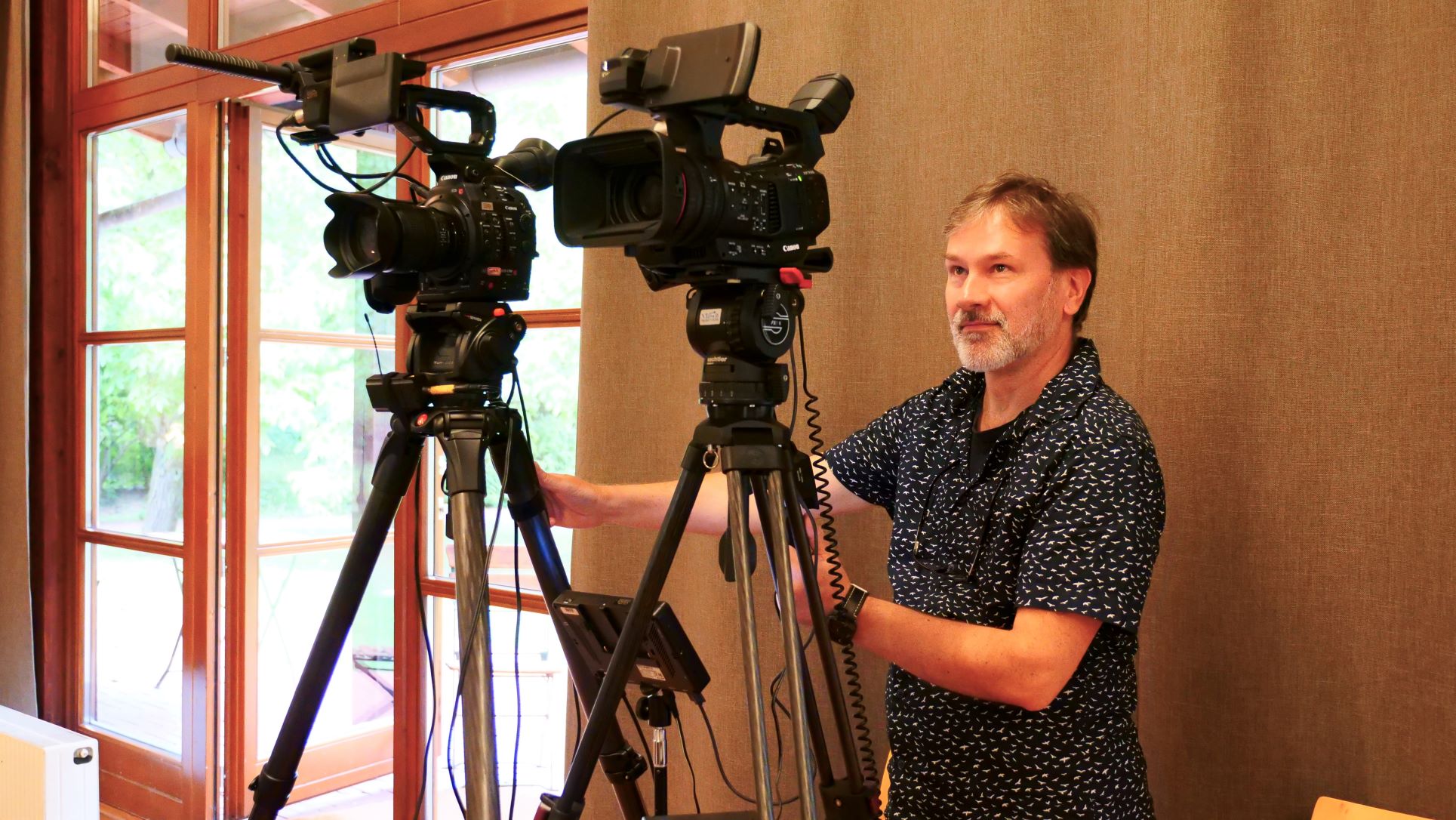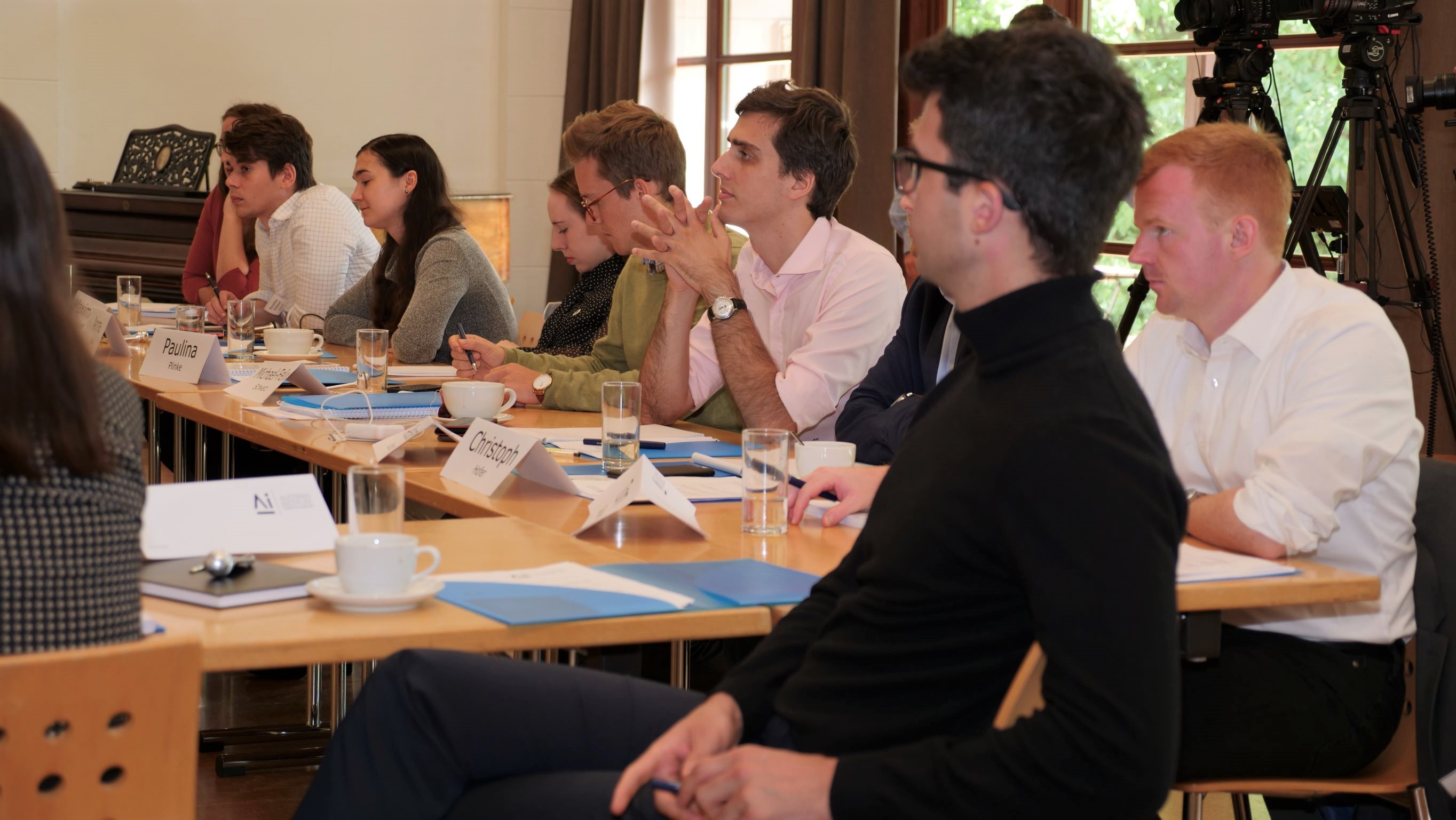
For three days, twenty-three young people—some of them already working students—from Germany, Austria, and Switzerland met for what is now the third Austrian Academy organized by the Austrian Institute. As in previous years, the guiding theme was “Market Economy and Entrepreneurship—Their Contribution to a Free and Humane Society.”
The speakers—renowned university professors, a journalist, and a well-known entrepreneur—from Germany, Austria, Great Britain and France shed light on this topic from economic, historical, socio-philosophical, journalistic and entrepreneurial perspectives. As usual it was a variety of competencies and points of view. The common denominator was the point that capitalism and the market economy are the foundations of our prosperity, which, thanks in part to globalization, is beginning to spread to countries that were still trapped in poverty only decades ago.
The participants’ appetite for questions and discussion seemed unlimited—for many, the event apparently acted as a release from a one-and-a-half-year lockdown of academic face-to-face lecturing.
Under the direction of Gerold Rauscher, Vice President of the Austrian Institute, there were a total of twelve lecture units or lectures, along with a panel of the speakers. Lively discussions took place at the panel and after the lectures, which could also be interrupted with questions. The participants’ appetite for questions and discussion seemed unlimited. This was perhaps also because for many of the participants this event served as an escape from a one-and-a-half-year lockdown of academic in-person lectures.
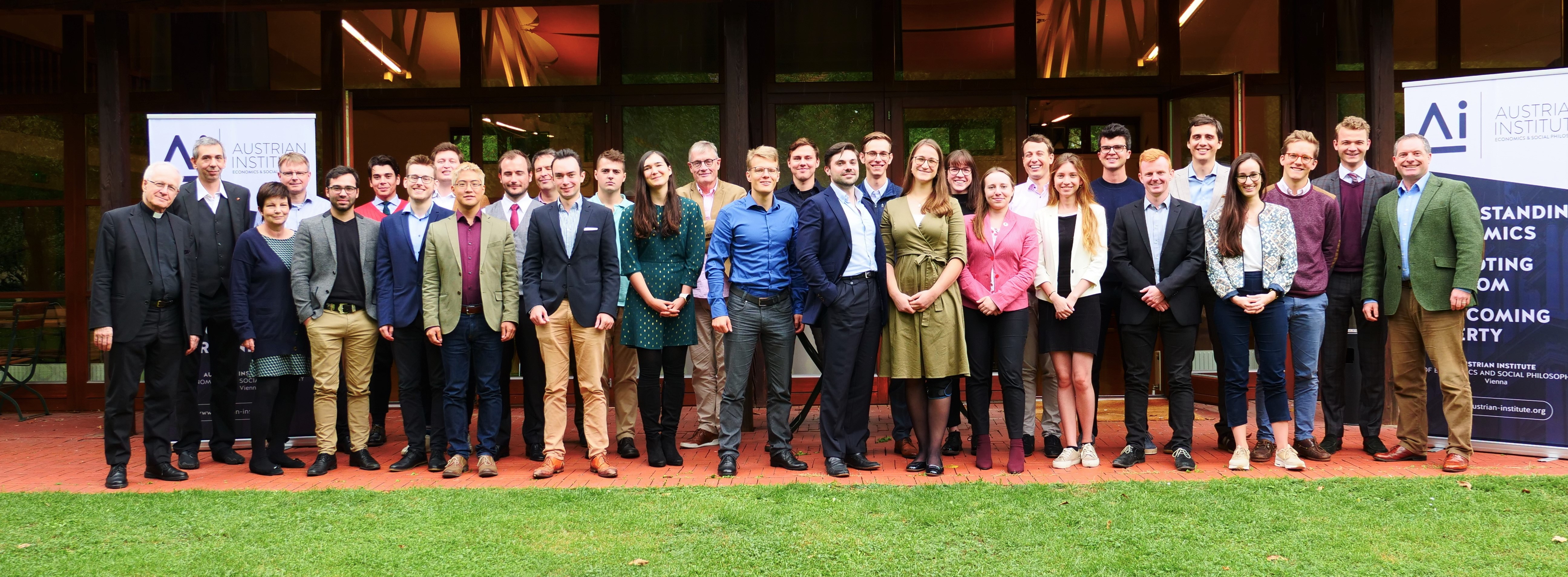
The conversations and discussions continued during and after the meals, often deep into the night, especially after the barbecue party on Saturday evening. Contributing to this success was the beautiful, rural ambience at the Friedrichshof amidst the vineyards of Burgenland (along with countless wind turbines, albeit not very visible), as well as the cultivated cuisine of the seminar hotel.
Capitalism, Entrepreneurship, and Market Economy—The Economic Form of Giving
For the introductory lecture on Thursday evening, the President of the Austrian Institute, Martin Rhonheimer stood in for Dr. Franz Schellhorn, Director of Agenda Austria, who was prevented from attending for family reasons. Rhonheimer explained why the capitalist market economy is the “economic form of giving.” He argued historically, spanning a wide arc, as well as with theoretical considerations that can probably best be described as an economically grounded ethics.
It became clear that capitalism does not begin with an exchange, but with giving—the “giving” of the capitalist, entrepreneur, and investor under uncertainty—and it has historically led to mass prosperity. This was analyzed in various respects, especially in confrontation with the Marxist theory of exploitation based on the labor theory of value, to which Rhonheimer opposed the subjective theory of value going back to Carl Menger. It is only with this subjective theory of value that one can understand the decisive “labor of capital”—the cause of the labor of the workers, their increasing productivity and the growing prosperity connected with it.
Growth skepticism is therefore misplaced, even for the purpose of solving environmental problems such as climate change. Nature is not the good mother to whom we must return and to whom we should trustfully hand ourselves over; rather, as Rhonheimer also justified theologically from a biblical perspective, she has become man’s enemy as a result of the original Fall—man’s turning away from God.
However, humanity can compensate for this “expulsion from paradise” by mastering nature through technology. While capitalism in its early forms was a predation of nature, a more developed capitalism is increasingly less so. This is because it is precisely the competitive nature of free-market capitalism—the compulsion to cut costs—as well as clever legal requirements that are leading to an increasing decoupling of growth and resource consumption. However, the ultimate criterion for interventions in nature is always the benefit of human beings because they alone possess dignity and have rights. This is the only reason why concern for the preservation of nature is also important. Thus, it is precisely capitalism and the market economy that fulfill humanity’s original mandate, and in a new way.
Market Economy, Capitalism, and Entrepreneurship as the Basis for Prosperity and Progress
Stefan Kooths, Director of the Business Cycle and Growth Research Center at the Kiel Institute for the World Economy and, since 2020, also Professor of Economics at the BSP Business & Law School in Berlin, as well as Chairman of the Friedrich August von Hayek Society, provided the microeconomic rationale for what was outlined in the introductory lecture under the title “Market Economy, Capitalism, and Entrepreneurship as the Basis for Prosperity and Progress.”
Kooths based his argument on conceptual and analytical tools drawn from the Austrian School of Economics. Carl Menger’s subjective value theory and marginal utility theory, transformed into an economic theory of action by Ludwig von Mises, shed new light on familiar concepts such as the law of comparative advantage—in Mises’s terminology: the “law of association.”
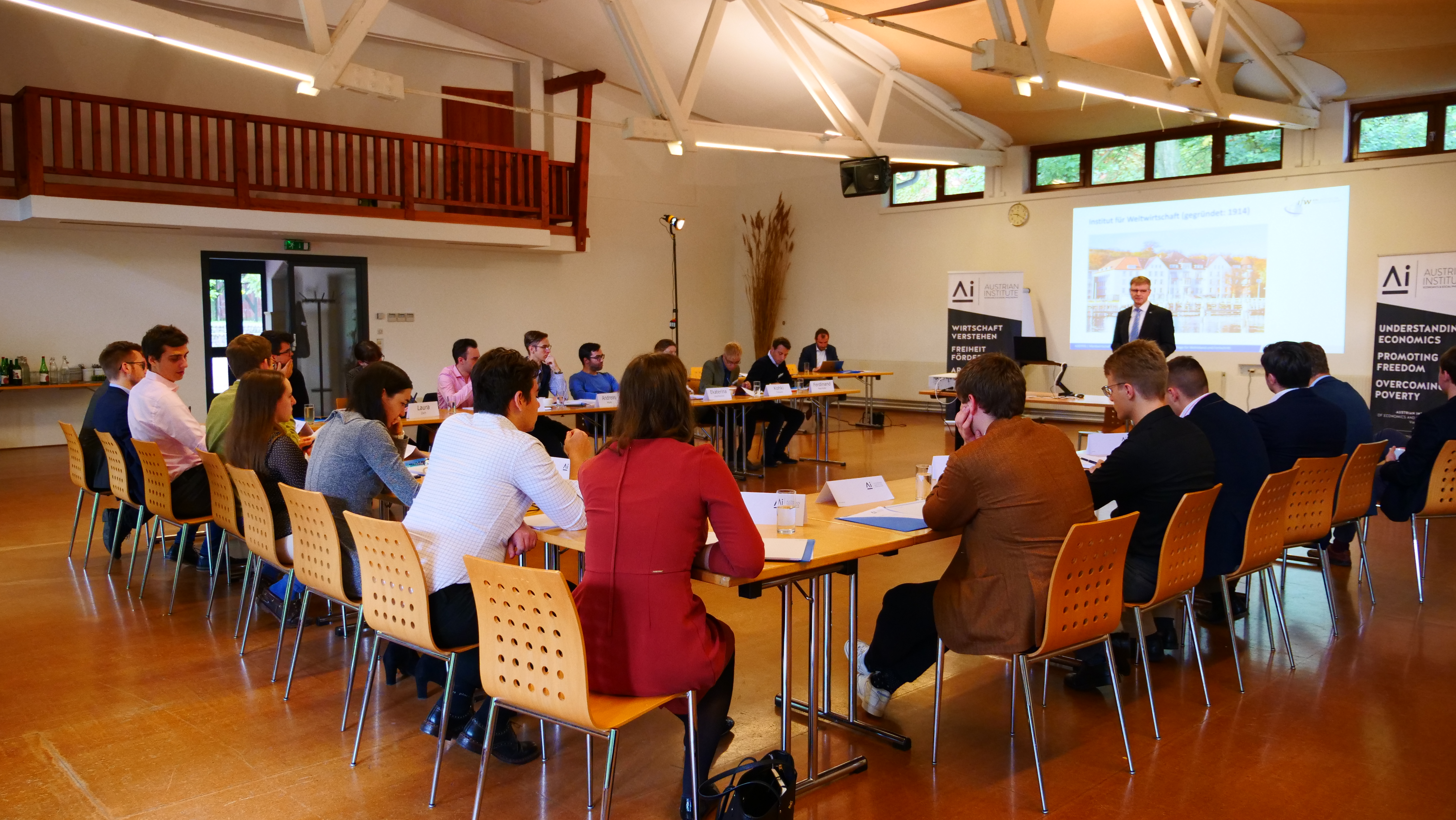
Kooths showed the validity of this law not only for international trade—i.e., across national borders—but also precisely for exchange relations within national borders, i.e., between individual actors. For in economic activity everything always revolves around an opportunity cost calculation, regardless of whether there is a national border between the participants. What was exciting was the evidence—both theoretical and empirical—of how, in a free market economy, comparative cost advantages resulting from productivity gains in some sectors of a country’s economy raise wages in all occupations. For example, because IT professionals earn more and more as a result of huge productivity gains, their opportunity costs for everyday services like haircuts rise. As a result, hairdressers’ wages also rise over time, even though their physical productivity has remained unchanged over the decades. Kooths introduced the conceptual pair of volume productivity (physical productivity progress) and value productivity (productivity progress related to purchasing power) for this purpose.
Thus, the market economy proves to be inherently inclusive and thus an actual “social economy.” Productivity increases in the best-paid occupations spill over to the less productive sectors in the form of wage increases—thus, everyone wins. This means that the market economy alone produces a social balance. In Germany, for example, over the last 30 years, the IT sector has seen the highest productivity gains, yet wages have risen far more in construction and agriculture, despite much smaller improvements in productivity.
These are just a few brushstrokes of an enormously rich two-part lecture that filled the entire first morning.
Globalization before and after the COVID Pandemic: Should There Be a New Normal?
Speaking on the topic of globalization before and after the Coronavirus pandemic was Philip Booth, long-time research director of the Institute of Economic Affairs in London, senior fellow of the same and now director of the Vinson Centre for the Public Understanding of Economics at the University of Buckingham, and professor of public finance, public policy and ethics at St. Mary’s University in Twickenham (London).
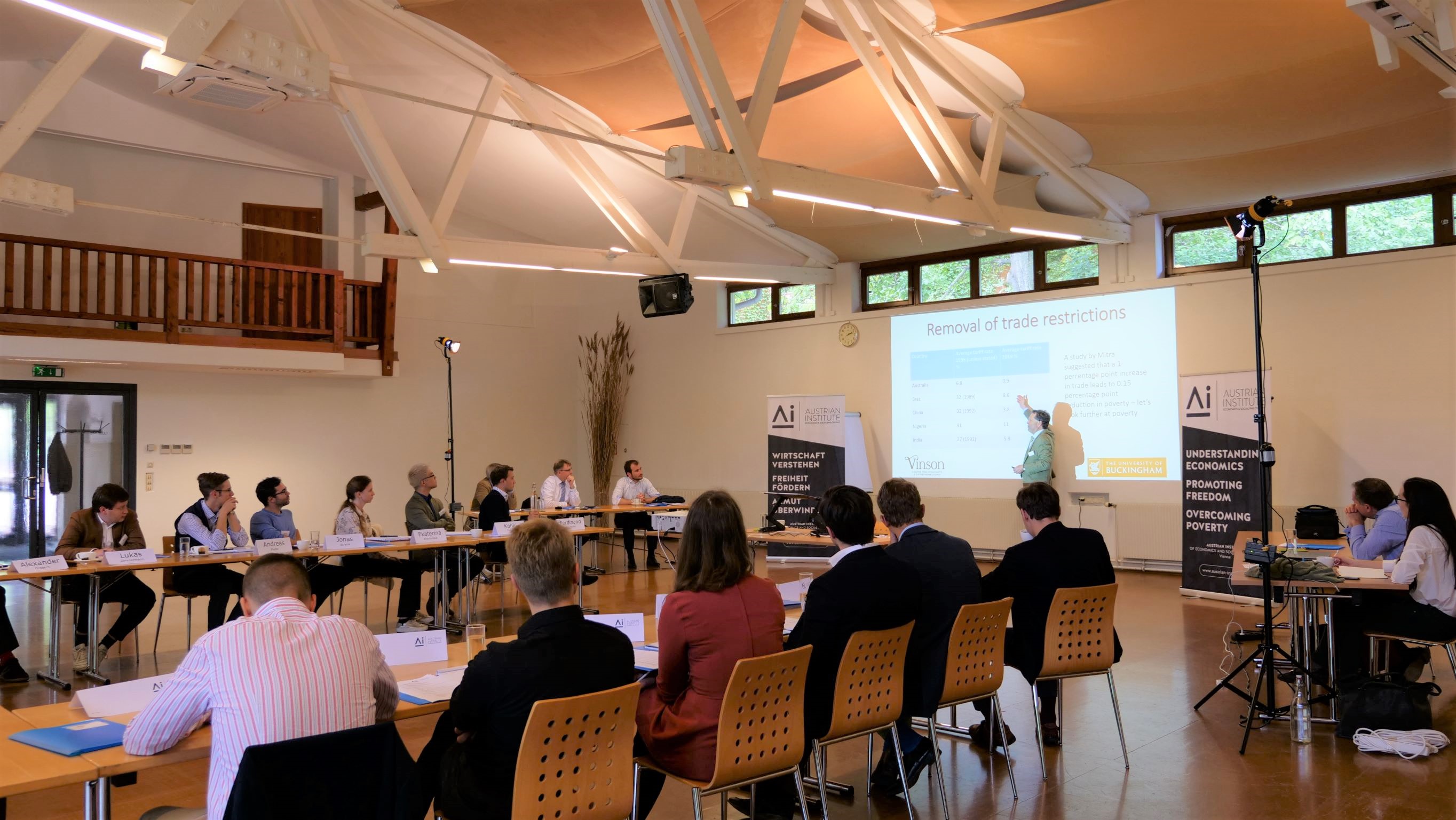
Philip Booth’s presentation in English, “Globalization before and after the Covid-Pandemic: Should There Be a New Normality?” showed that after Coronavirus we do not need a new normal because the “old normal,” as a result of an increasingly globalized economy, has continuously and almost dramatically improved the world, especially the situation in the less developed countries. It is not globalization, nor the market economy, nor capitalism that is a danger and should be reformed; it is the policies that might provide the wrong, anti-market response to the pandemic that are the real danger precisely to the growth of prosperity in the world’s poorest countries.
In a slide of his presentation entitled “An alternative reading of the crisis,” Booth summarized his position as follows: “COVID has demonstrated that those who are poor are vulnerable to economic, health and ecological shocks because they lack the savings to ensure their resilience and because they live in countries where governments have limited institutional capacity to deal with the difficulties resulting from such events. As such, we need to ensure that we have the most rapid economic development possible in poorer countries.” And this is only possible with progressive globalization, capitalism and a market economy based on the protection of private property.
Capitalism—An Ethical Problem?
“Capitalism, freedom, and human dignity: Is Capitalism an Ethical Problem?”—this question was posed, in another two-part lecture, by Werner Plumpe, holder of the Chair of Economic and Social History at the Goethe University of Frankfurt am Main. Plumpe offered a fascinating insight into the “conversion of semantics,” the change in the meanings of words such as self-interest, rationality, individuality, and their underlying anthropological concepts as modern capitalism emerged.
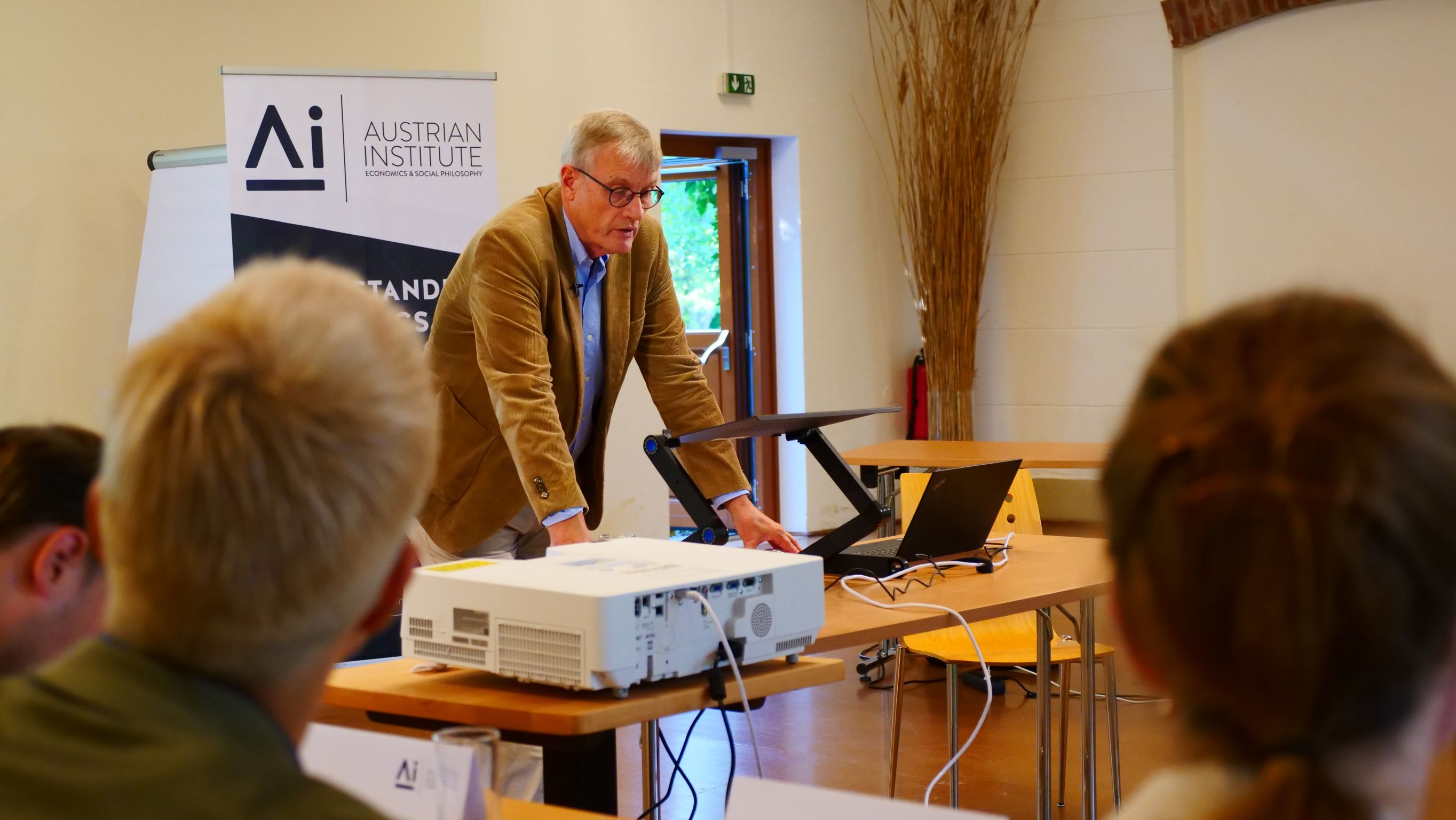
Classically, this change—the emergence of a positive ethic of self-interest or self-love in favor of the common good—can be grasped in Adam Smith’s well-known formulation: “It is not from the benevolence of the butcher, the brewer, or the baker, that we expect our dinner, but from their regard to their own interest. We address ourselves, not to their humanity but to their self-love, and never talk to them of our own necessities but of their advantages.” In this new perspective, as Plumpe put it, the “budget-rational human being (…) is precisely not the immoral human being, but the only responsible actor acting under the conditions of a modern (market-integrated) economy.”
The old assumption of good order through sinless behavior is not abolished, but recoded: Now, those who do not act in a self-responsible and budget-rational manner are virtually committing an offence against the natural order. The perspective shifts insofar as capitalism enforces budget- rationality, it is precisely an ethical value!” The prototype of this behavior is Benjamin Franklin, quoted at length (“Remember that time is money…”). Thus, the semantics of homo economicus gradually emerges as that of an ethically responsible figure who brings blessings to the community. These semantic shifts thus index a new ethos that is emerging due to the wealth-creating effects of the capitalist economy.
Money and Interest Theory—and the Economic and Social Consequences of the Low Interest Rate Policy
All of Saturday morning belonged to Karl-Friedrich Israel, assistant professor of economics at the Université Catholique de l’Ouest Angers (France). Trained at Humboldt University in Berlin, ENSAE Paris-Tech and Oxford University, the young German economist of the Austrian School—he did his PhD under Guido Hülsmann and worked for two years with Gunther Schnabl in Leipzig—spoke first on the “Fundamentals of Money and Interest Rate Theory,” and in then on the “Economic and Social Consequences of Low Interest Rate Policies.” What is money, what is interest, and what is its function in a market economy?
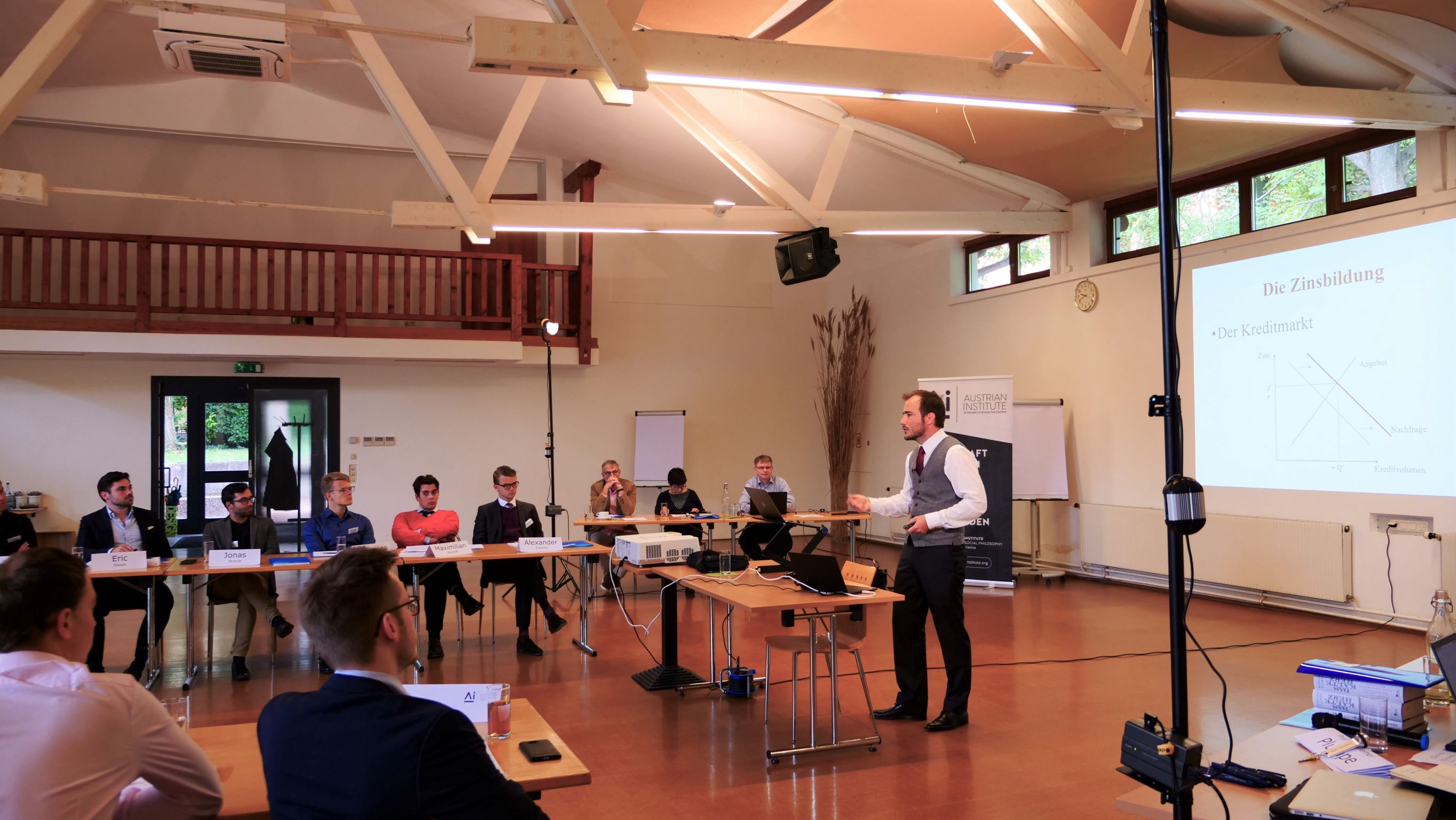
With conceptual precision and by means of illustrative examples, Israel explained the coordinating function of interest in the context of the market-based price system. In doing so, he drew on the crucial insights of the Austrians (in both the sense of nationality and school affiliation) Eugen von Böhm-Bawerk and Ludwig von Mises. Combining the difference in value between present and future goods and the related subjective time preference, one arrives at the concept of original interest or primordial interest as the price discount that future goods suffer compared to present goods.
How this plays out in detail and what are the consequences of an interest rate policy that manipulates the interest rate, the connection with the expansion of the money supply or inflation and social inequality led to the slightly distressing insight that the current monetary policy is moving on a slippery slope and has extremely antisocial consequences: it favors the wealthy at the expense of the less wealthy or poor.
The speaker’s always objective explanations were able to captivate the participants and inspire them with enthusiasm for what at first seemed to be a dry topic. It became clear how the Austrians’ theory of interest in particular makes the anthropological and action-theoretical connections clear: At the center is the human being as a being with needs, as an acting individual—and as an entrepreneur who uses the constant imbalances of the real world as an opportunity for business and innovation and thus creates a benefit for the customer and for society as a whole—functions that are made more difficult, if not impossible, by interventionist monetary and interest rate policies.
Why Do Capitalism and the Market Economy Get Such Bad Press?
This was the topic we assigned Ursula Weidenfeld, the well-known German economic journalist. Dr. Weidenfeld studied economic history, economics and German language and literature, and earned her doctorate at the Bonn Chair of Constitutional, Economic and Social History with a dissertation on the politics of the middle classes. She is a journalist also known as a book author, bringing along her latest work on Angela Merkel, Die Kanzlerin: Porträt einer Epoche which was just published by Rowohlt Verlag.
It’s all about perspective—that was the first message from the former staff writer for Wirtschaftswoche, head of the business editorial department and deputy editor-in-chief of Berlin’s Tagespiegel and then editor-in-chief of Impulse magazine. The perspective of media professionals is impartiality, distance, insight into the political context and constraints that are often ignored in economic theory. We live in a democracy, and this must not be put at risk.
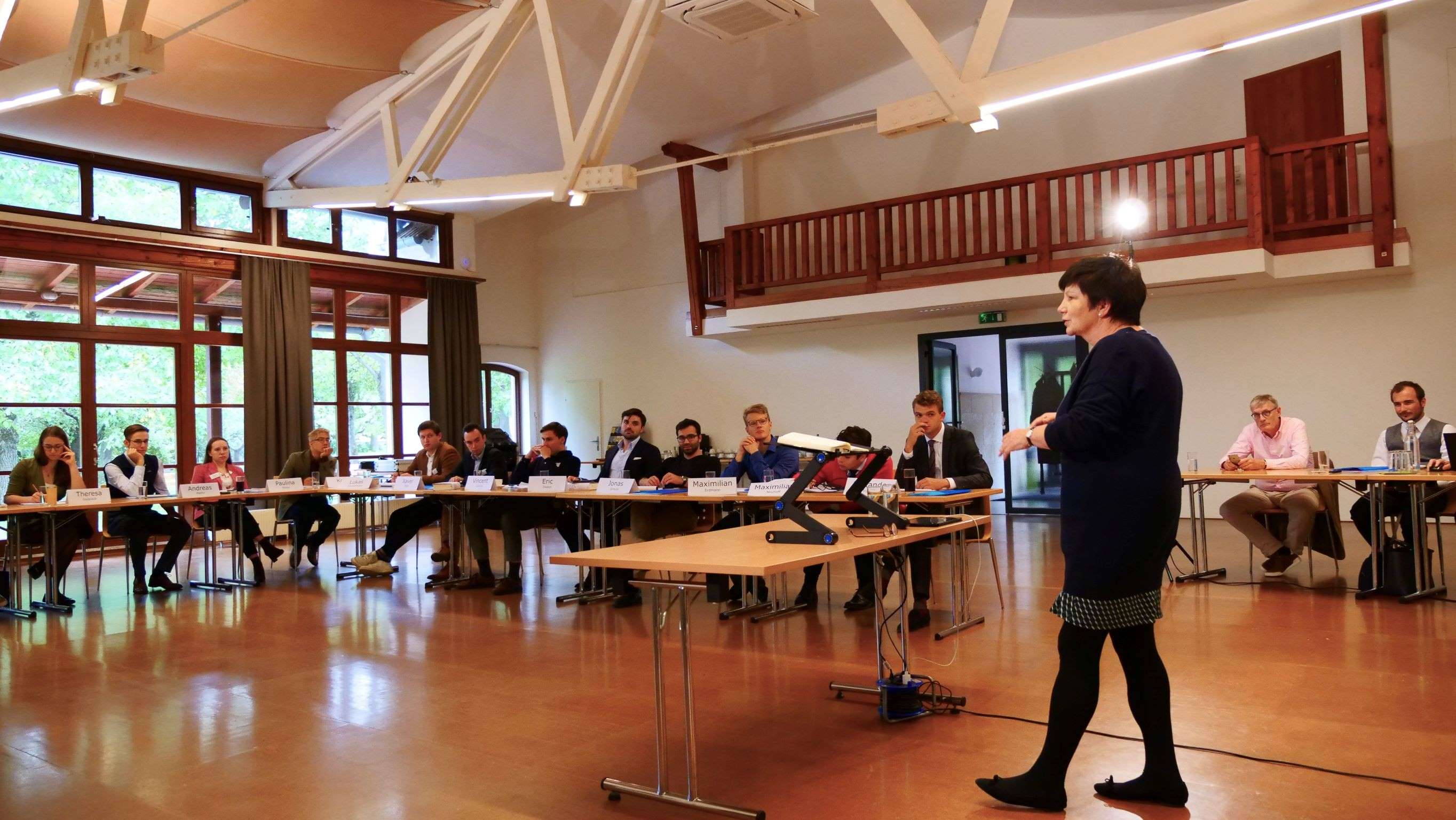
Democracies function on the basis of majorities and the acceptance of majority decisions. This is challenging and often uncomfortable for the economically savvy. A staunch economic liberal, she offered fascinating insights into what moves journalists—or should move them—and the ways in which public opinion can be influenced.
There is a lack of understanding in both directions. The lack of understanding for capitalism and the market economy—which has not increased, but rather decreased in the longer historical development that followed the Second World War, at least in Germany—can also be explained as a consequence of the often insufficient sensitivity of the economic profession to what is politically possible. This is thus a plea for pragmatism and understanding of the situation.
This is what Ms. Weidenfeld reiterated in the evening panel discussion with Professors Kooths, Rhonheimer, Israel and Plumpe. This also led to critical inquiries and animated requests to speak. The politically realistic view of the economic journalist and moderator was an enriching addition for those who sometimes think solely in terms of right and wrong and exclude the perspective of what is pragmatically feasible in concrete political contexts.
Market Economy, Social Inequality, Justice, and the Role of the State
The social-philosophical highlight of Austrian Academy 2021 was the lecture by Martin Rhonheimer on “Market Economy, Social Inequality, Justice and the Role of the State.” What is just, so goes the basic message, is not to be equated with what is desirable: the desirable alone is not a criterion for justice. Therefore, a society according to a certain distribution pattern, as it seems desirable, cannot be a requirement of justice.
Neither is poverty in itself unjust, even if it arouses our sympathy and we rightly feel obliged as fellow human beings to do something about it. But this alone does not mean that social inequality can generate claims against the state. For this, Rhonheimer invoked the view of U.S. philosopher Harry G. Frankfurt: “From a moral perspective, it does not matter that everyone has the same thing. What matters morally is that everyone has enough.”
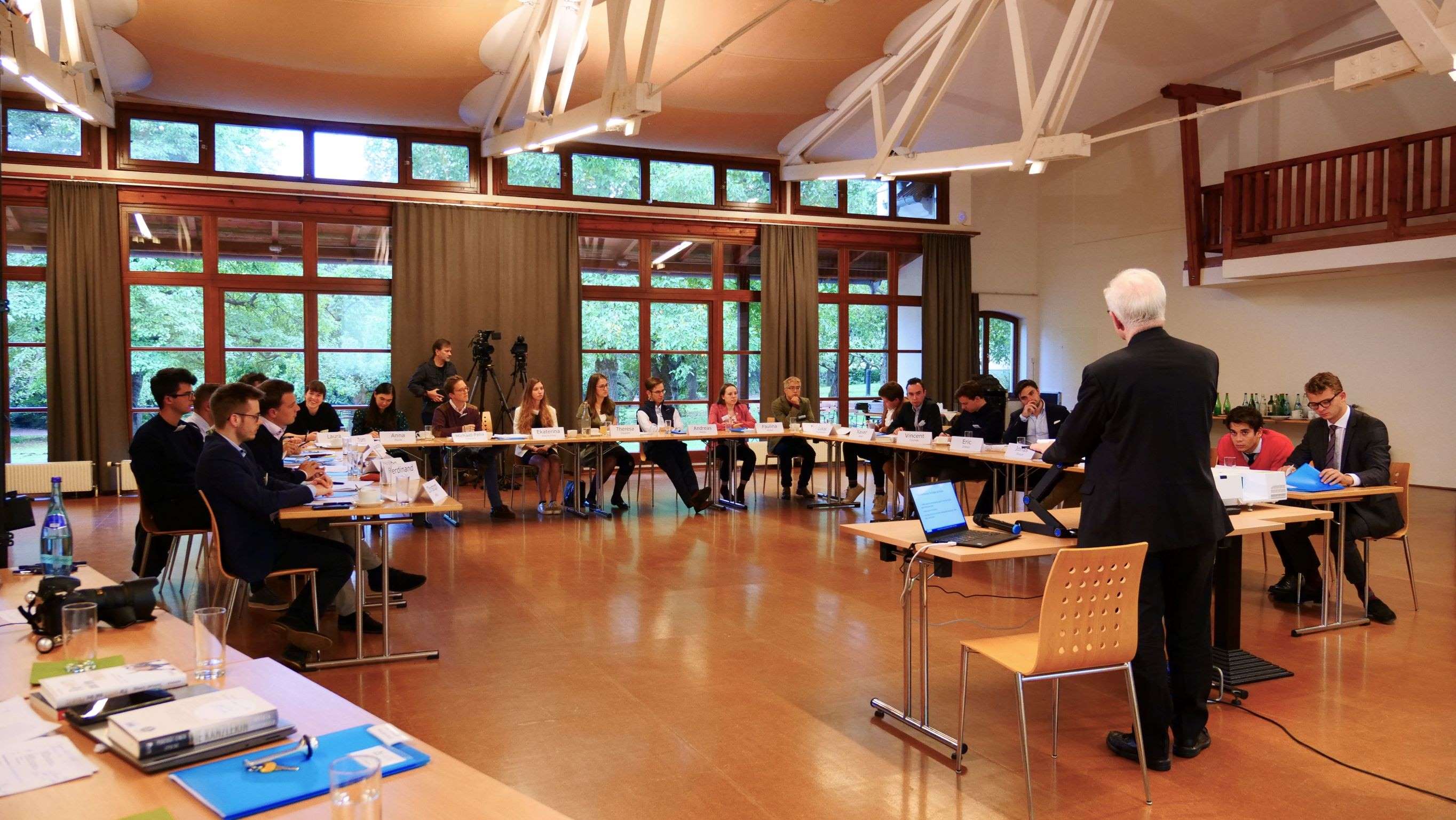
The ethicist and political philosopher explained why this is so in various steps. In doing so, he basically endorsed Friedrich A. von Hayek’s thesis that the results of market processes cannot be categorized as “just” or “unjust” because markets are not intentional, willing actors and their results are not based on an intended goal. However, the market can produce unjust results if it is embedded in rules or institutional arrangements that are themselves unjust, e.g., because they discriminate against certain groups of people. In that case, the legal discriminations are, as it were, transferred by the market to its results.
What is crucial, he argues, is a life of dignity and freedom, as well as the question of how prosperity is created. A life in dignity and freedom depends only to a limited extent on material resources. What is decisive is that one stands on one’s own feet in one’s life and, in principle, has the possibility to improve this life of one’s own accord, with one’s work. It is therefore fundamentally unjust to prevent this through legal or institutional, especially bureaucratic, barriers. Needs must not be confused with rights. Real social injustice lies in legal inequality; true equality is equality before the law. Rhonheimer confronted the classic objection that formal legal equality can only be just insofar as it is a material requirement of equality, but he also offered clear counterarguments. Moreover, he showed the inner contradictoriness of this demand, which must ultimately end in a freedom-destroying spiral of intervention.
To a certain extent, the speaker subscribed to John Rawls’ difference principle, which, according to Rhonheimer, is best met precisely in a capitalist-market economy, because inequality in that context also benefits the poorest. Capitalism—as he had already emphasized in his first lecture with reference to Werner Plumpe’s History of Capitalism (a copy of which each participant received)—is the economic system of the poor and for the poor (or lower classes). The fundamental task of the state, he said, is not social security—which can be organized in a variety of ways, including non-governmental ones—but the creation and enforcement of the legal rules that enable and promote the process of wealth creation.
From Entrepreneurial Flight to Failure and Back to Success Again
As always, Sunday morning concluded with the voice of an entrepreneur—in this case, the Austrian Damian Izdebski, who immigrated from Poland at a young age and became famous for the spectacular bankruptcy—after an equally spectacular flight of fancy—of his first startup, the company DiTech. His presentation was entitled “My best mistakes”—the story of a failure and all its sometimes brutal economic and private consequences, but also the story of a recovery, symbolized by the hashtag #startupagain.
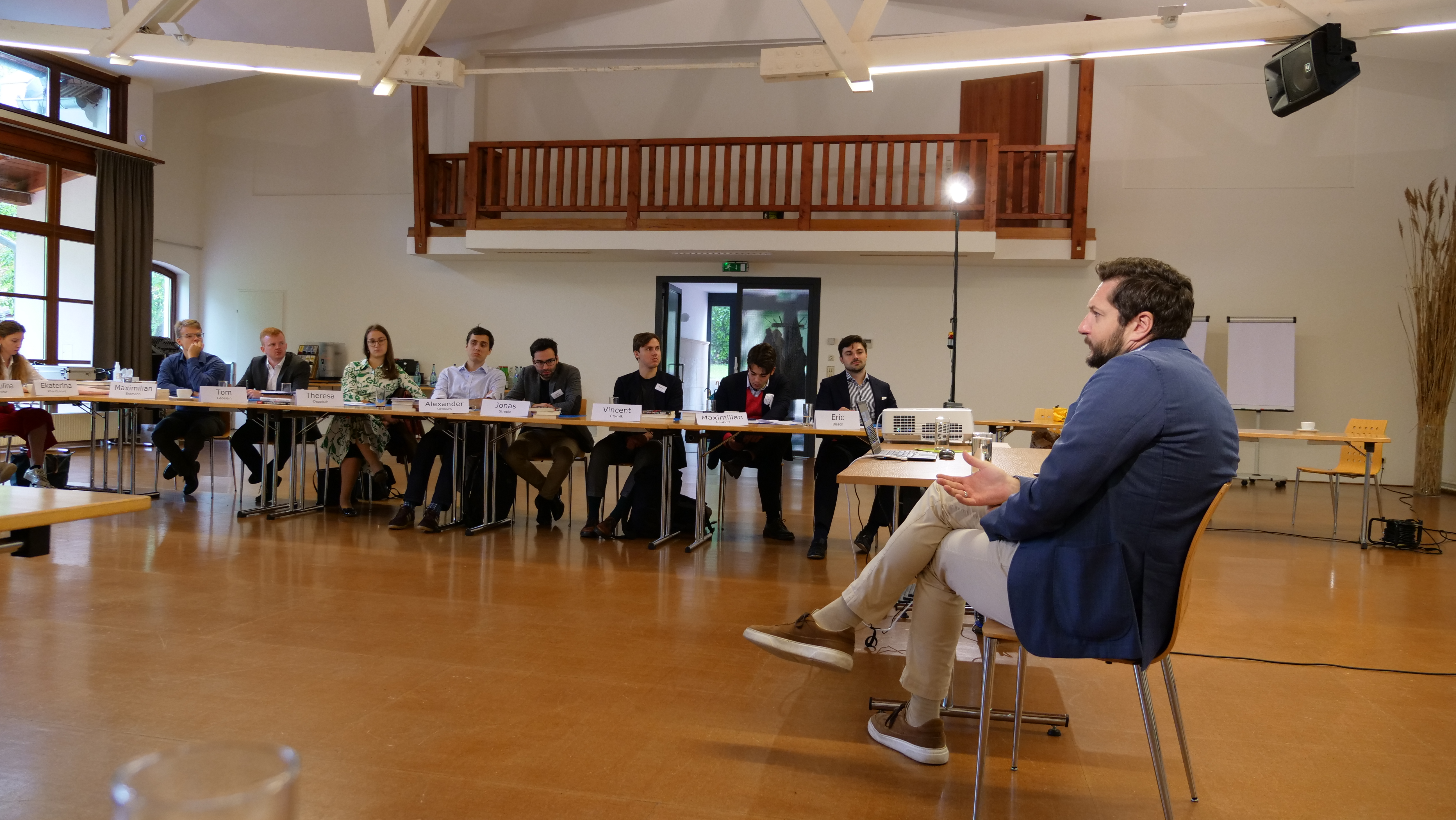
The new startup is called techbold—it is no longer in retail, but in the service sector. Damian Izdebski told his story, analyzed mistakes, and offered insights that are fascinating and motivating for young people. Simply confronting one’s mistakes relentlessly can lead to the success of a new beginning—a lesson that is important for young people and gives older people the opportunity to look critically at their lives and ask themselves whether they have already learned this lesson.
Panel with the Speakers and Discussion with the Participants
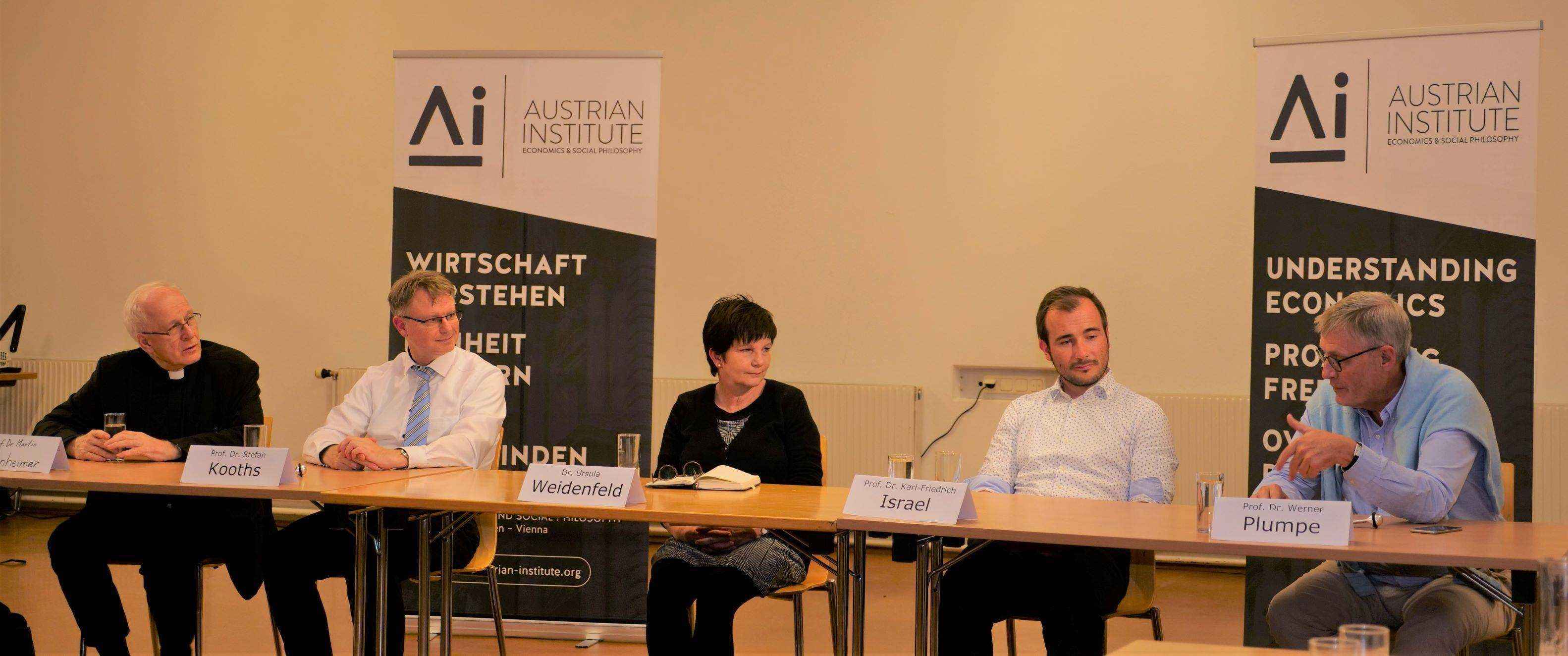
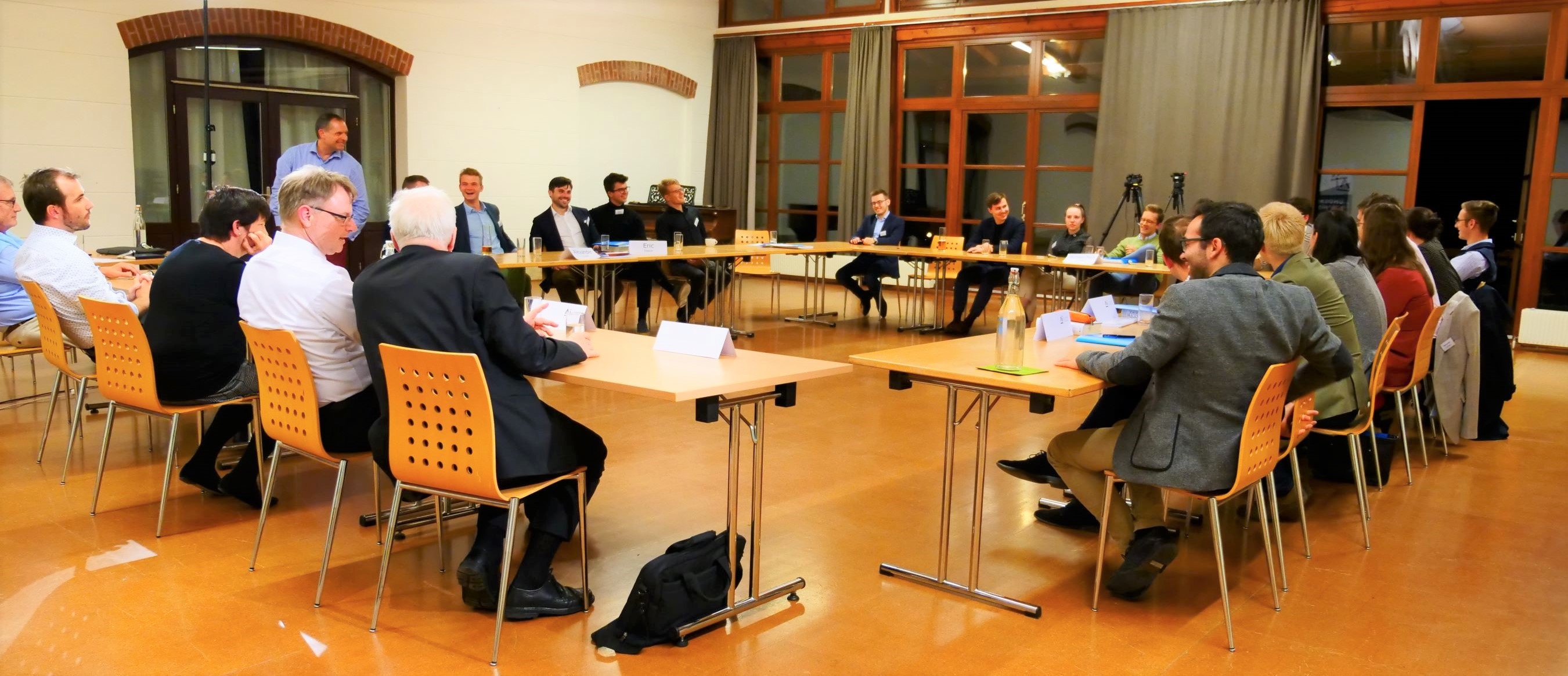
In short: the Austrian Academy was a success, also from the organizers’ point of view. The sponsors, especially the Friedrich A. von Hayek Foundation, Berlin, cooperative partner of Austrian Academy 2021, as well as the Austrian Federation of Industry (IV) and other private sponsors deserve our sincere gratitude. The gratitude of the twenty-two young people, who received a full scholarship for participation and accommodation, only having to pay for the travel expenses, was especially evident during the their personal farewell on the occasion of the presentation of a certificate of participation by the President of the Austrian Institute.
The Austrian Academy 2022 is scheduled for September 15-18, 2022, at the same venue.
The lectures filmed by Patrick Zadrobilek (NTown Productions) will be published as videos on our website in the foreseeable future, like those of previous years.
Photographic impressions of the Austrian Academy 2021 (click on the first picture, then continue):
Venue of the
AUSTRIAN ACADEMY 2021:
The Seminarhotel am Friedrichshof – near Vienna.
Römerstraße 2, A-2424 Zurndorf (Austria)

Translated from German bei Thomas and Kira Howes

